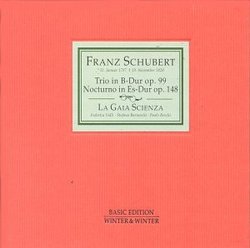| All Artists: Franz [Vienna] Schubert, Gaia Scienza Title: Schubert: Trio, Op. 99 / Nocturne, Op. 148 Members Wishing: 0 Total Copies: 0 Label: Winter & Winter Release Date: 8/25/1998 Genre: Classical Styles: Chamber Music, Historical Periods, Classical (c.1770-1830) Number of Discs: 1 SwapaCD Credits: 1 UPC: 025091001729 |
Search - Franz [Vienna] Schubert, Gaia Scienza :: Schubert: Trio, Op. 99 / Nocturne, Op. 148
 | Franz [Vienna] Schubert, Gaia Scienza Schubert: Trio, Op. 99 / Nocturne, Op. 148 Genre: Classical
|
Larger Image |
CD Details |
CD ReviewsSpirited performance and beautiful recording shively@agecon.purdue.edu | West Lafayette, Indiana | 11/22/1998 (4 out of 5 stars) "Wonderful!This is a lively and spirited performance of a classic Schubert Trio piece. You will not be disappointed. I can't seem to get the disk out of my CD changer. The 20-bit "un-processed" recording is flawless. The sonic quality is outstanding and serves to highlight the venue, which in this case is the Villa Medici in Briosco. Great soundstage.The Italian "La Gaia Scienza" trio (note Amazon's typo) is definitely in command of the material. Two of the artists (F. Valli - Fortepiano and P. Beschi - Violincello) teach at the Como conservatoire. The third (S. Barneschi - Violin) teaches at the Scuola Civica in Milano. The playing is sleek, with a certain degree of playfulness--especially in the Scherzo. The Rondo is played quite forcefully.Although the B-flat trio is the obvious highlight of the disk, the accompanying E-flat nocturne is no less enjoyable.As if the 1997 performance and recording were not enough, this release on the German Winter & Winter label is tastefully packaged in a form that nicely complements the performance. The CD case is textured cardboard and liner notes are permanently attached in booklet form. Liner notes are printed in German, English, French, Italian, Spanish, and Japanese.My only complaint is that the liner notes are a bit sparse. But who needs to read when you have music like this to enjoy!" Magic Mushroom Music Giordano Bruno | Wherever I am, I am. | 07/29/2010 (5 out of 5 stars) ""Little Mushroom" - Schwammerl - was one of Franz Schubert's nicknames among his cafe-crawler friends. Little Franz was a bit of a carouser, possibly a heavy drinker, certainly a highly sociable guy who burned his candle at both ends. "Hip", in short, and not the puling sufferer that late romantic biographers portrayed. Even the pitiful image of his death from syphilis, contracted from a single liaison with a prostitute, turns out to be a flimsy mythification; there is no incontrovertible evidence that syphilis caused his death, or even that syphilis was the "serious illness' that struck him in his early twenties. The poignant melancholy that supposedly pervades his music may in fact be an artifact of performance. No composer has ever been as constrained as Schubert by tradition ... posthumous tradition that is.
Schubert's Opus 99 Trio for Fortepiano, Violin, and Cello is as exuberant and expansively joyous as its performers choose to make it. In this interpretation by La Gaia Scienza, it ripples with vigor and flexes its biceps in a sunny open field. Opus 99 and Opus 100, companion trios, were written more or less back to back in the last year of Schubert's life, and Opus 100 was the chef d'oeuvre in the successful public concert-hall performance of his own works that Schubert conducted that year. Opus 100 has remained the better known of the two trios, the one whose melodies all Schubertians hum in the shower, but Opus 99 is every bit as wonderful a piece. I've already reviewed the separate CD of Opus 100, performed by Gaia Scienza. The really good news is that both CDs, both trios, are now available together in a single package. Since Schubert was, as I said, "hip" in the manner of his generation in Vienna, it's thoroughly appropriate that his music be appropriated by HIP performers. "Historically Informed Performers" like La Gaia Scienza, I mean. Paolo Beschi plays an unmodified 18th C cello with gut strings, Stefano Barneschi likewise a violin such as Schubert would have known, and Federica Valli plays an 1815 fortepiano made by Johann Schanz, of precisely the sort Schubert favored. The timbre of that fortepiano is as sweet and transparent as water in one of the fountains of Schloss Schönbrunn, but even more essential to the brilliance of this recording is the balance of the trio ensemble, in which the 'vocal' phrases of the strings are not overwhelmed by the saturated resonances of a modern piano. Once you've heard this performance of Opus 99, I doubt you'll ever want to hear the trio on a-historical instruments again. But you can listen to the 'samples' here on amazon and decide for yourself." |

 Track Listings (5) - Disc #1
Track Listings (5) - Disc #1